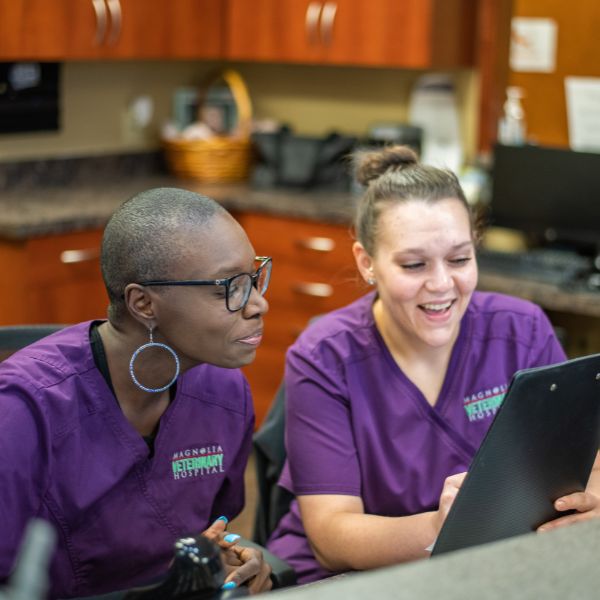Anderson, SC 29625
Frequently Asked Questions
There is no question too big or too small for our veterinary team. Below are some answers to our most common questions.

Our Policies
Hospital Policies
Below are the policies of Magnolia Veterinary Hospital.
Appointment Policy
For your convenience, ‘drop-off’ appointments are available for established patients/clients. A ‘drop off’ means you could bring your pet at the time that works best for you and leave him/her with us for a couple of hours. Usually we will ask you to drop off’ sometime in the morning so our doctors can examine the patient in between appointments or at the time purposely reserved for admitted patients. These ‘drop-off’ appointments can be utilized for normal wellness visits, or for sick patients that need to be seen when there are no open appointment times.
We are not able to offer “drop-off” visits for new clients.
Patient Arrival Policy
Payment Policy
We require full payment at the time that services are rendered. For your convenience, we accept Visa, MasterCard, Discover, cash and paypal.
If your pet is hospitalized (kept in the hospital for care) a deposit of half the estimated cost is required at the time of admission.
Unfortunately, we are not able to allow payment plans. If you will need this service, we do accept CareCredit which is a third party “medical credit card” that offers delayed billing and payments
Emergency Fees
7am-Midnight daily
For emergencies outside normal business hours please go to the Animal Emergency Clinic in Greenville (864-232-1878).
Please call for exam prices.
Our History
Surgical FAQs
At Magnolia Veterinary Hospital, many people have questions about various aspects of their pet and we hope this information will help.
Is the anesthetic safe?
Today’s modern anesthetic monitors have made surgery much safer than in the past. Here at Magnolia Veterinary Hospital, we do a thorough physical exam on your pet before administering anesthetics, to ensure that a fever or other illness won’t be a problem. We also adjust the amount and type of anesthetic used depending on the health of your pet. The handout on anesthesia explains this in greater detail.
Preanesthetic blood testing is important in reducing the risk of anesthesia. Every pet needs blood testing before surgery to ensure that the liver and kidneys can handle the anesthetic. Even apparently healthy animals can have serious organ system problems that cannot be detected without blood testing. If there is a problem, it is much better to find it before it causes anesthetic or surgical complications. Animals that have minor dysfunction will handle the anesthetic better if they receive IV fluids during surgery. If serious problems are detected, surgery can be postponed until the problem is corrected.
It is important that surgery be done on an empty stomach to reduce the risk of vomiting during and after anesthesia. You will need to withhold food for at least 8 to 10 hours before surgery. Water can be left down for the pet until the morning of surgery.
Will my pet have stitches?
Will my pet be in pain?
Anything that causes pain in people can be expected to cause pain in animals. Pets may not show the same symptoms of pain as people do; they usually don’t whine or cry, but you can be sure they feel it. Pain medications needed will depend on the surgery performed. Major procedures require more pain relief than things like minor lacerations.
For dogs, we may recommend an oral anti-inflamatory the day after surgery and several days after to lessen the risk of discomfort and swelling. We use newer medications, which are less likely to cause stomach upset and can be given even the morning of surgery.
Because cats do not tolerate standard pain medications such as aspirin, ibuprofen, or Tylenol, we are limited in what we can give them. Recent advances in pain medications have allowed for better pain control in cats than ever before. We administer a pain injection 10 minutes prior to surgery. After surgery, pain medication is given on a case by case basis. Any animal that appears painful will receive additional pain medication.
We use narcotic patches or continuous iv infusions for some surgeries in dogs and cats as well. The cost will depend on the size of the animal.
Providing whatever pain relief is appropriate is a humane and caring thing to do for your pet, but healing is also improved when pain is adequately cornea.
What other decisions do I need to make?
When you bring your pet in for surgery, we will need to 5 to 10 minutes of time to fill out paperwork and make decisions on the blood testing and other options available. When you pick up your pet after surgery you can also plan to spend about 10 minutes to go over your pet’s home care needs.
We will call you the night before your scheduled surgery appointment, to confirm the time you will be dropping your pet off and to answer any questions you might have. In the meantime, please don’t hesitate to call us with any questions about your pet’s health or surgery.
